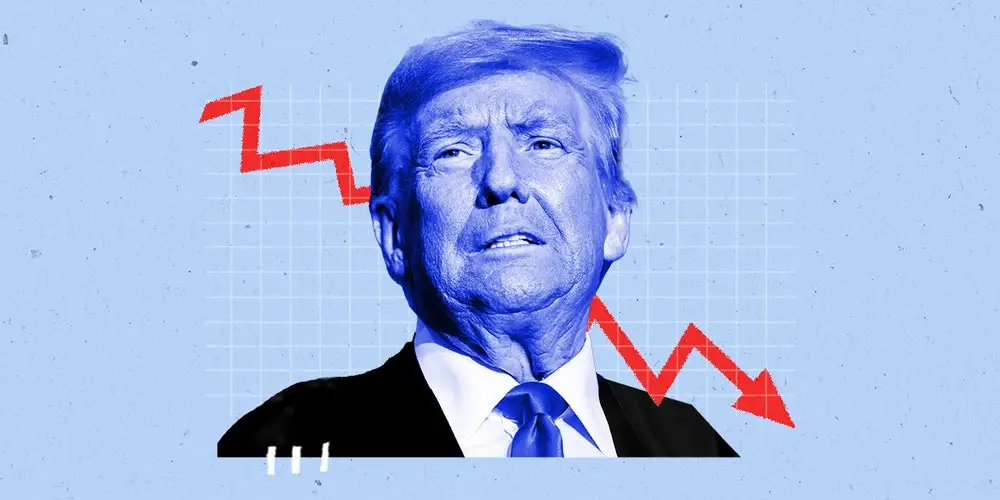Many of Donald Trump’s economic policies during his presidential campaign were considered highly unwise, even by corporate leaders who prioritized profits above all else. Universal and large tariffs, as well as mass deportations, were clearly anti-growth policies that threatened profit margins. Despite this, supporters of Trump often promoted the idea of a “stock market veto” that would supposedly prevent him from enacting policies that could trigger market declines.
The assumption was that because Trump frequently cited stock market gains as proof of his economic success during his first term, he would avoid actions that could lead to a downturn.
However, this theory has not held up. In his second term, Trump has continued to push for broad and high tariffs, mass deportations, and has introduced new destabilizing measures, including arbitrary and illegal firings of federal employees and cancellations of federal contracts. Additionally, he has supported a U.S.
House budget resolution that would significantly reduce disposable incomes for the bottom half of American households. Beyond being unwise, these policies have been implemented with significant chaos.
As a result, the stock market has reacted negatively. The S&P 500 has fallen by 8% in the past month.
What the Stock Market Actually Measures
When people discuss the stock market, they usually refer to indexes that track stock prices of publicly traded companies, such as the S&P 500 or the Dow Jones Industrial Average.
In theory, stock prices reflect investor expectations about future returns, including dividends and capital gains. However, these fluctuations do not necessarily indicate broader economic health.
Stock market prices provide new data points daily and are discussed frequently, but they do not accurately measure the economic well-being of U.S. households.
Stock prices do not reflect job creation, wage growth, or financial stability for most Americans. Sometimes, stock market gains coincide with broader economic growth, but other times they result from wealth transfers from workers to corporate profits.
Most households rely on wages rather than investment income, making the stock market an unreliable measure of their economic status. The wealthiest 10% of households own over 85% of all corporate stock, with the top 1% alone controlling roughly 50%.
Nearly half of U.S. households have no significant stock market investments, even when factoring in indirect holdings like 401(k) accounts.

What Drives Stock Market Fluctuations?
Several factors can influence stock prices:
- Economic Growth Expectations – If investors believe economic growth will accelerate, they expect higher corporate profits, which should increase stock prices.
- Wage-to-Profit Redistribution – Shifting income from wages to corporate profits benefits shareholders. Increased monopoly power or weakened labor bargaining power can contribute to this shift. Estimates suggest nearly half of real corporate sector wealth growth between 1989 and 2017 resulted from such redistributions.
- Corporate Tax Rates – Lower corporate taxes increase the value of pre-tax earnings, boosting stock prices.
- Interest Rates – Falling interest rates increase the present value of future earnings, raising stock prices. The decline in U.S. interest rates from 7% to 3% over the past 30 years, for example, has significantly inflated stock values.
Trump’s Policies Are Weakening the Economy—And the Stock Market
Under President Joe Biden, the real value of the S&P 500 surged by 27% in his final year in office. Corporate profits remained historically high, inflation subsided post-pandemic, and expectations for Federal Reserve rate cuts provided further market optimism.
Investors assumed that as long as Trump’s second term avoided major economic missteps, stock prices would remain strong due to pro-corporate tax policies and efforts to suppress worker wages.
However, markets have dropped sharply as Trump’s economic agenda becomes clearer. His policies are both anti-growth and inflationary—a rare but damaging combination.
Slow growth will reduce corporate profits, dragging down stock prices. Cuts to federal employment and spending, combined with chaotic tariffs and potential mass deportations, will suppress economic demand while driving inflation.
Though Trump’s administration continues efforts to weaken worker bargaining power—potentially boosting corporate profits—profit shares are already historically high, making further gains difficult. Any benefits to stock prices from suppressing wages are likely to be overshadowed by broader economic downturns.
If Trump’s policies drive the economy into recession, the Federal Reserve may cut interest rates, which could provide temporary relief for stock prices. However, by that point, significant damage to jobs and wages would already be done.
A Stock Market Decline That Reflects Economic Reality
While the stock market is not a perfect measure of economic health, its recent decline is a worrying sign. It reflects broader economic instability caused by Trump’s policies, which threaten to increase unemployment and slow wage growth. If a “stock market veto” against these anti-growth policies were ever going to take effect, now is the time.
Mark Cuban’s Fight Against High Drug Prices: ‘How Much Money Do I Really Need?’




